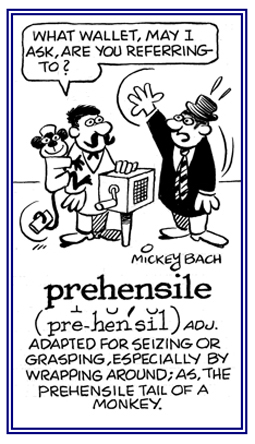pre-, prae-
(Latin: before [both in time and place])
The prefix prae- can actually be substituted for pre- because both of them are different spellings for the same prefix meaning "before".
A liking of something or a predisposition to have a favorite choice: As a farmer, Charlie showed a preference for raising prize-winning chickens as opposed to raising cattle.
prefix (verb), prefixes; prefixed; prefixing
1. To put or to attach something before or in front of another element: When Joe Rogers completed his medical training, he was allowed to prefix his name as "Dr. Joe Rogers".
3. In grammar and vocabulary, to add part of a word to the front of another a word: To prefix "dis" in front of "believe" results in "disbelieve".
The author wrote a preface which was prefixed at the beginning of his book.
2. To settle or to arrange in advance: The manager of the store in New York made sure his employees prefixed the items with the correct $ amount and the ¢ suffix when it was applicable, for example when a shirt was on sale for $5.50¢ (5 dollars and 50 cents).3. In grammar and vocabulary, to add part of a word to the front of another a word: To prefix "dis" in front of "believe" results in "disbelieve".
preflight (adjective) (not comparable)
Referring to something taking place before a plane takes off: After all the passengers were on board the aircraft and before lifting off, the travellers could read the preflight safety information in a pamphlet in the pouch of the seat back.
The examination or inspection of a plane before take off: Preflights were required for each plane before the passengers were allowed on board for departure.
preflight (verb), preflights; preflighted; preflighting
To inspect or to perform a check-up of a plane before departure: It is mandatory that aircrafts are preflighted and examined before take off.
A greater or a superior brightness: Ellen enjoyed the prefulgency of her new lamp, which was much better than her old one, and noticed that she had no problems with reading her favorite book!
The condition of bearing a developing fetus in the uterus: Josephine's mother said that her pregnancy lasted 9 months before giving birth to her.
While going through pregnancy, Mike's cat became fatter and fatter and finally she had 4 little kittens!
pregnant (adjective) (not comparable)
Pertaining to a woman who has a developing child within her body; expectant: Jane went to her doctor for a regular check-up and found out that she was pregnant and would have a baby in about 9 months!
The ability or the act of taking hold of something firmly with the hands or other parts of the body: Elephants have the prehensibility of using their trunks and monkeys also have it by utilizing their tails.
prehensible (adjective); more prehensible, most prehensible
Characteristic of a creature or a human that is able to seize and grasp something: In order for people to be prehensible, they must use their hands and fingers!
prehensile (adjective); more prehensile, most prehensile
Descriptive of animals or people who are capable of grabbing or holding something by wrapping around it: Elephants have prehensile trunks that they use to grasp and to feed themselves by holding on to whatever it is that they want to eat.

© ALL rights are reserved.
Go to this Word A Day Revisited Index

Go to this Word A Day Revisited Index
so you can see more of Mickey Bach's cartoons.
The act of grasping, taking hold, or gripping something, especially with the hands: Mary was in the kitchen cooking dinner where she had a lot of prehensions to perform before the meal would be ready for consumption by her family.
Many monkeys use tail prehensions when climbing around in trees.
pre-hexameral (adjective) (not comparable)
Relating to a period before the creation of all existence: In Jane's book, the author was exploring what it might have been like in pre-hexameral times prior to the world and the galaxy.
prehistoric (adjective); more prehistoric, most prehistoric
A reference to antiquity for which there is no documentary evidence: The prehistoric times took place before the written history of earlier or more recent cultures, civilizations, societies, and ways of life on earth.
prehistorical (adjective); more prehistorical, most prehistorical
Concerning the period existing prior to recorded chronicles or accounts of the past: Some archeologists have found and uncovered famous prehistorical settlements, confirming that they really existed!
Related before-word units: ante-; antero-; anti-; pro-.
Related "time" units: aevum, evum; archaeo-, archeo-; Calendars; chrono-; horo-; Quotes: Time; tempo-.


